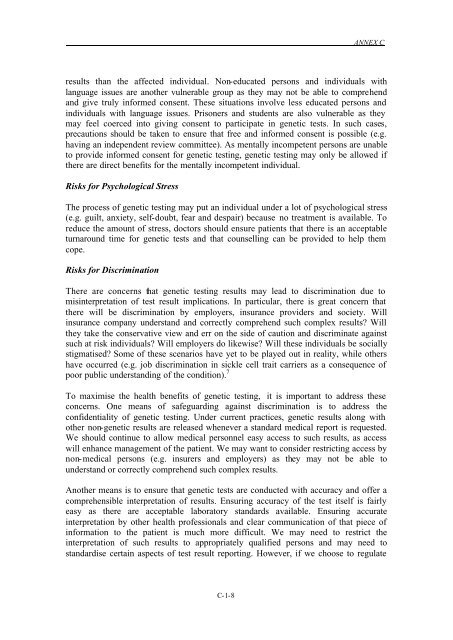Medical, ethical, legal and social issues in genetic - Bioethics ...
Medical, ethical, legal and social issues in genetic - Bioethics ...
Medical, ethical, legal and social issues in genetic - Bioethics ...
Create successful ePaper yourself
Turn your PDF publications into a flip-book with our unique Google optimized e-Paper software.
C-1-8<br />
ANNEX C<br />
results than the affected <strong>in</strong>dividual. Non-educated persons <strong>and</strong> <strong>in</strong>dividuals with<br />
language <strong>issues</strong> are another vulnerable group as they may not be able to comprehend<br />
<strong>and</strong> give truly <strong>in</strong>formed consent. These situations <strong>in</strong>volve less educated persons <strong>and</strong><br />
<strong>in</strong>dividuals with language <strong>issues</strong>. Prisoners <strong>and</strong> students are also vulnerable as they<br />
may feel coerced <strong>in</strong>to giv<strong>in</strong>g consent to participate <strong>in</strong> <strong>genetic</strong> tests. In such cases,<br />
precautions should be taken to ensure that free <strong>and</strong> <strong>in</strong>formed consent is possible (e.g.<br />
hav<strong>in</strong>g an <strong>in</strong>dependent review committee). As mentally <strong>in</strong>competent persons are unable<br />
to provide <strong>in</strong>formed consent for <strong>genetic</strong> test<strong>in</strong>g, <strong>genetic</strong> test<strong>in</strong>g may only be allowed if<br />
there are direct benefits for the mentally <strong>in</strong>competent <strong>in</strong>dividual.<br />
Risks for Psychological Stress<br />
The process of <strong>genetic</strong> test<strong>in</strong>g may put an <strong>in</strong>dividual under a lot of psychological stress<br />
(e.g. guilt, anxiety, self-doubt, fear <strong>and</strong> despair) because no treatment is available. To<br />
reduce the amount of stress, doctors should ensure patients that there is an acceptable<br />
turnaround time for <strong>genetic</strong> tests <strong>and</strong> that counsell<strong>in</strong>g can be provided to help them<br />
cope.<br />
Risks for Discrim<strong>in</strong>ation<br />
There are concerns that <strong>genetic</strong> test<strong>in</strong>g results may lead to discrim<strong>in</strong>ation due to<br />
mis<strong>in</strong>terpretation of test result implications. In particular, there is great concern that<br />
there will be discrim<strong>in</strong>ation by employers, <strong>in</strong>surance providers <strong>and</strong> society. Will<br />
<strong>in</strong>surance company underst<strong>and</strong> <strong>and</strong> correctly comprehend such complex results? Will<br />
they take the conservative view <strong>and</strong> err on the side of caution <strong>and</strong> discrim<strong>in</strong>ate aga<strong>in</strong>st<br />
such at risk <strong>in</strong>dividuals? Will employers do likewise? Will these <strong>in</strong>dividuals be <strong>social</strong>ly<br />
stigmatised? Some of these scenarios have yet to be played out <strong>in</strong> reality, while others<br />
have occurred (e.g. job discrim<strong>in</strong>ation <strong>in</strong> sickle cell trait carriers as a consequence of<br />
poor public underst<strong>and</strong><strong>in</strong>g of the condition). 7<br />
To maximise the health benefits of <strong>genetic</strong> test<strong>in</strong>g, it is important to address these<br />
concerns. One means of safeguard<strong>in</strong>g aga<strong>in</strong>st discrim<strong>in</strong>ation is to address the<br />
confidentiality of <strong>genetic</strong> test<strong>in</strong>g. Under current practices, <strong>genetic</strong> results along with<br />
other non-<strong>genetic</strong> results are released whenever a st<strong>and</strong>ard medical report is requested.<br />
We should cont<strong>in</strong>ue to allow medical personnel easy access to such results, as access<br />
will enhance management of the patient. We may want to consider restrict<strong>in</strong>g access by<br />
non-medical persons (e.g. <strong>in</strong>surers <strong>and</strong> employers) as they may not be able to<br />
underst<strong>and</strong> or correctly comprehend such complex results.<br />
Another means is to ensure that <strong>genetic</strong> tests are conducted with accuracy <strong>and</strong> offer a<br />
comprehensible <strong>in</strong>terpretation of results. Ensur<strong>in</strong>g accuracy of the test itself is fairly<br />
easy as there are acceptable laboratory st<strong>and</strong>ards available. Ensur<strong>in</strong>g accurate<br />
<strong>in</strong>terpretation by other health professionals <strong>and</strong> clear communication of that piece of<br />
<strong>in</strong>formation to the patient is much more difficult. We may need to restrict the<br />
<strong>in</strong>terpretation of such results to appropriately qualified persons <strong>and</strong> may need to<br />
st<strong>and</strong>ardise certa<strong>in</strong> aspects of test result report<strong>in</strong>g. However, if we choose to regulate


